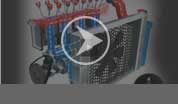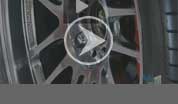Category Archives: Brakes
Hitting The Brakes In Grimes
Hello Des Moines, let’s talk about brakes. Braking, as all IA motorists know, is slowing or stopping your vehicle. As you can imagine, brakes are engineered to work well on a particular vehicle application. For example, you would expect more powerful brakes on a heavy-duty pickup that routinely hauls big loads and pulls trailers, than you would on a compact car. And a Corvette that can go over 180 miles per hour would have much different braking needs than the family mini-van you drive around between Des Moines, Altoona and Grimes.
 But the mechanical aspects of the brakes themselves are just one issue. There’s also the power brake pump and brake fluid. And then there are the tires, which are critical to the effectiveness of the brakes.
But the mechanical aspects of the brakes themselves are just one issue. There’s also the power brake pump and brake fluid. And then there are the tires, which are critical to the effectiveness of the brakes.
Let’s step back. A new minivan or truck rolls off a local Des Moines showroom floor. It has brand new brakes with brand new brake pads. The brake lines and pump are filled with fresh fluid and are completely clean inside. And the tires are brand new, with full tread. It is ready to go.
Naturally, braking power is at its peak performance. Now the miles start to add up on the minivan. Des Moines drivers tend to focus on the brake pads. In the automotive business, the pads, and shoes on drum brakes, are called the friction material. That’s because they provide the friction used to stop the vehicle. The pads are designed to be effective throughout their useful life – it’s not until they are worn so thin as to be out of car makers’ specs that they lose their ability to stop.
The mechanical parts of the brakes have pistons and springs that get quite a workout while breaking. Over many miles around IA, these wear and get gummed up. They start to lose effectiveness gradually and could even fail – a scary possibility That’s why a regular brake inspection at Des Moine BDG is important for your minivan and your family’s safety. At Des Moine BDG we can test the operation of the brakes and see if any parts need cleaning or replacing.
That leads us to brake fluid service at Des Moine BDG. Some of the critical additives in the fluid that lubricate and clean the minivan fluid system are depleted over time. That and moisture building up in the system reduce the performance of the brake fluid. A brake service at Des Moine BDG cleans out deposits, water and dirt. Then the system is filled up with fresh fluid.
The tires are what connect the minivan to the road. Stopping force all comes down to traction. The better the tires grip the road, the quicker you’ll stop.
This is especially important on wet Altoona area expressways and surface streets. Studies have shown that wet stopping distance increases significantly as tires wear down. IA motorists need to understand that they can have brakes that are operating at peak efficiency and yet still be in danger because their tires are worn out.
Put On The Brakes: Brake Service At Des Moine BDG
When it comes to preventive maintenance and car care, most Des Moines auto owners know how critical it is to check their brakes. But brakes are more than just brake pads and shoes. There are a lot of components in the brake system, and they all need to be in good working order.
The pads and shoes are known as the friction materials in the brake system. They push together, providing friction, which stops the vehicle. It’s no wonder they have to be checked regularly for wear, and that brake pads and shoes need to be replaced periodically.
Brake pads/shoes gradually wear out, but that doesn’t mean your braking gradually becomes less effective. The pads are engineered so that they maintain good braking until they wear too thin to provide adequate friction. At this point, they need to be replaced.
But your braking system also has mechanical parts. These pistons and springs can also gradually wear out or get gummed up by oil, dirt and other road spatter. A brake inspection in Des Moines at Des Moine BDG includes a check of these parts as well as the pads and shoes. Your helpful Des Moine BDG service professional can then advise you of any parts that need cleaning or replacement.
The fluid component to the brake system needs a regular check-up at Des Moine BDG as well. The brake fluid cools and protects your brake system. Protective additives are gradually depleted by the operation of the brake system, and moisture build-up inside the fluid can diminish its effectiveness. When you have your brakes serviced at Des Moine BDG in Des Moines, the fluid should be checked and, if needed, replaced, which will clean out water, debris and dirt.
It is critical to remember that your brake system also includes your tires. No matter how well your brake system is performing, if your minivan tires are worn, you won’t get good stopping power. Traction is the gripping power of your tires to the roadway. Traction is always better on tires with a good tread. Good traction translates to good braking.
This is particularly essential on wet Ankeny roads. A good tire will give you good braking on either wet IA roads or dry. But stopping distance increases dramatically when worn tires meet wet roads. Tread on a tire acts to channel away water as the minivan passes over the wet road, thus maintaining contact between the tire’s surface and the road, which maintains traction. But the thinner the tread, the less effective the water channels become, and water can get between the tire and the roadway, reducing friction. A loss of friction means a longer stopping distance and possibly the loss of control.
Braking depends on two things: the weight of your minivan and the speed of the vehicle. The heavier the vehicle or the faster the vehicle, the more braking power it requires. Thus, brake systems vary from vehicle to vehicle. For example, a pickup that is designed for heavy loads has a more powerful braking system than a compact car. Sports cars also have higher-grade braking systems than minivans.
Regardless of what kind of car you drive in Des Moines, it is always good auto advice to keep your brake system in good repair, and that means ALL of your brake system. Just one more way to keep your travels accident and worry-free.
Braking News: Keep Your Stopping Power
Richard Petty once told AutoNetTV, “You’ve gotta have good brakes. If you’ve got good brakes you can keep yourself out of a lotta trouble.”
That’s why a regular brake inspection is on every Des Moines car’s maintenance schedule. An inspection at Des Moine BDG will check your brake system and let you know if there are any problems.
Of course, if you’re having trouble with your brakes, get your car into Des Moine BDG right away. Here are some symptoms to watch for:
- Low or spongy brake pedal
- Hard brake pedal
- A brake warning light that stays on
- Constantly squealing or grinding brakes
- Vibrations or clunking sounds when you apply your brakes
If you are experiencing any of these, it’s time to get your brakes checked.
There are two types of brakes: disc and drum. Disc brakes have a rotor that’s attached to the axle. Calipers straddle the rotor, kind of like the brakes on a bicycle.
Drum brakes are more common on back wheels. Both types have pads or shoes that press against the brakes and slow the vehicle. Brake pads and shoes are made out of very tough material to withstand the heat and force generated when stopping your car. Eventually, they wear out with use, and become too thin and need to be replaced.
If the brake pads wear away completely, you can damage the rotors. The calipers can grind grooves in the rotor. Then the rotor must either be resurfaced or replaced. That’s not only expensive, but also dangerous because your vehicle won’t stop as quickly. Sometimes rotors warp or crack and must be replaced.
Brake service will also include a check of your brake fluid. When the brakes are applied, the pressure in the fluid actives the brake pads or shoes. Not enough fluid means not enough pressure to brake properly. Also, water builds up in the brake fluid over time, which leads to corrosion, leaks and brake damage, and with hard use, the brakes could severely fade or even fail. You should change the brake fluid when your manufacturer recommends to avoid these problems.
There are different grades of brake pads; good, better and best. Higher grades cost more, but give better braking performance and smoother operation. It’s OK to upgrade your brake pads. But, never use a grade that’s lower than what the manufacturer recommends.
So, be sure to properly maintain your brakes, because it’s a lot cheaper than paying the body shop after an accident.
Come in to Des Moine BDG for an brake inspection before damage occurs. You can call ahead for an appointment by calling 1.800.LET.NAPA.







